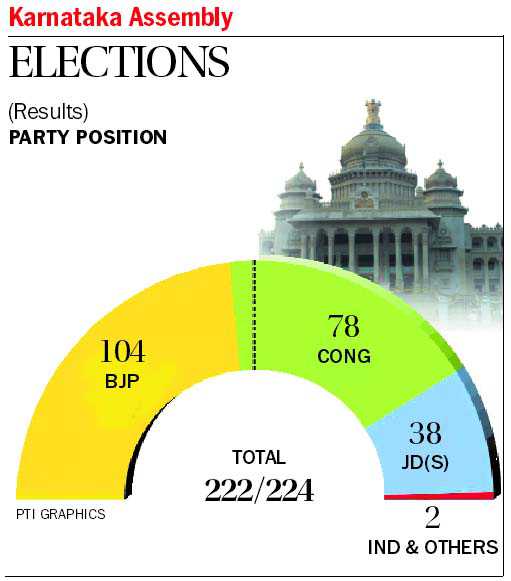
KS Dakshina Murthy
Bangalore-based journalist
MUCH has been made out of the fact that the Congress got a better vote share than the Bharatiya Janata Party in the just-concluded Karnataka Assembly elections. That the Congress secured two percentage points more than the BJP and yet came second is something that analysts are pointing out rather sardonically.
Of the 222 constituencies that went to the polls, the BJP secured 104 with an approximate vote share of 36 per cent. The Congress got a vote share of 38 per cent, but ended up with only 78 seats.
But should one be surprised that a party which secured a lower vote share ended up becoming the single largest in the elections? In fact, no election analysis is complete without conclusions being drawn about the apparent inconsistency between vote share and the number of seats that a party wins.
Political pundits generally remark how with a variance of two per cent, this difference between political parties in terms of seats amount to several seats. And, this is accompanied by an air of mystery.
What is surprising is how this perception of vote share has gained credence and has, in fact, led a robust existence so far. But is it really relevant? And, why is there so much of disparity between vote share and number of seats won?
Comparing vote share and number of seats won is an exercise in futility and erroneous. This is not to write off vote share. If at all, it is useful for statistical purposes.
Another logical corollary from this argument is the oft-repeated criticism about a political party winning elections with less than 50 per cent of the vote share. In the 2014 Lok Sabha elections, there were many who referred to the 31 per cent vote share of the BJP and wondered how it could be termed a wave. It may have been the least vote share for a party winning the Lok Sabha elections, but in general most winners tend to get less than 50 per cent of the total votes polled.
This is again the nature of elections in India. Of the total population, say 60 per cent are eligible to vote. Of this 60 per cent, even if around 70 per cent vote, the actual winner will most probably get less than 50 per cent of the total electorate. So when a party is perceived to secure a majority, it is actually a minority when the electorate is taken as a whole or many a time even if it is calculated only among those who voted.
It is time that vote share is relegated to its place in the hierarchy of political analysis and, instead, one spends time and effort looking at real trends and issues that affect elections.
How a party with a lower vote share ends up winning more seats
If we look at constituencies, no two are similar. The electoral strength of each varies. Let's take two small constituencies, for example, with 10, 000 voters each and one big constituency with 50,000 voters. If political party A wins the two smaller ones by securing 3,000 votes each, the party notches up 6,000 votes in total. In terms of vote share in those constituencies, it is 30 per cent. Party B gets 2,000 votes each, making its vote share 20 per cent.
In the big constituency, if party B wins the poll getting 30,000 votes, it means its vote share in that constituency is 60 per cent. Party A gets say 20,000 votes in this constituency which is 40 per cent.
In effect, if we take the three constituencies together, Party A has secured 37 per cent of the total vote share and two seats, while Party B has secured 48.6 per cent of the vote share and one seat.
While this is an elemental example, this is how it works in both Lok Sabha and Assembly constituencies across the country.



























